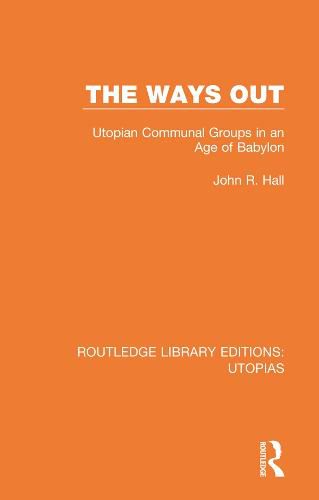Readings Newsletter
Become a Readings Member to make your shopping experience even easier.
Sign in or sign up for free!
You’re not far away from qualifying for FREE standard shipping within Australia
You’ve qualified for FREE standard shipping within Australia
The cart is loading…






A comparative analysis of both secular and religious communal groups in contemporary America, this study, originally published in 1978, shows that contemporary communalists stand in relation to collectivism much the same as early Protestants stood in relation to individualism - as the self-proclaimed pioneers of the new age. There is great diversity among communal groups, a diversity which is found to stem from alternative orientations towards time and alternative assumptions about the cognitive status of the social world.
The author has made use of a phenomenologically derived typological framework to organize the data he has obtained through living in and visiting a number of communal groups. Within this framework, Alfred Schutz’s ‘mundane’ phenomenology and Max Weber’s interpretive sociology are employed as ways of approaching the situated sociology of knowledge in various communal groups.
Six ideal types of communal groups are described: the commune, the intentional association, the community, the warring sect, the other-worldly sect and the ecstatic association. Two of these types - the intentional association and the community - are identified as participants’ efforts to demonstrate ‘worldly utopian’ models for the reconstruction of society at large.
$9.00 standard shipping within Australia
FREE standard shipping within Australia for orders over $100.00
Express & International shipping calculated at checkout
A comparative analysis of both secular and religious communal groups in contemporary America, this study, originally published in 1978, shows that contemporary communalists stand in relation to collectivism much the same as early Protestants stood in relation to individualism - as the self-proclaimed pioneers of the new age. There is great diversity among communal groups, a diversity which is found to stem from alternative orientations towards time and alternative assumptions about the cognitive status of the social world.
The author has made use of a phenomenologically derived typological framework to organize the data he has obtained through living in and visiting a number of communal groups. Within this framework, Alfred Schutz’s ‘mundane’ phenomenology and Max Weber’s interpretive sociology are employed as ways of approaching the situated sociology of knowledge in various communal groups.
Six ideal types of communal groups are described: the commune, the intentional association, the community, the warring sect, the other-worldly sect and the ecstatic association. Two of these types - the intentional association and the community - are identified as participants’ efforts to demonstrate ‘worldly utopian’ models for the reconstruction of society at large.